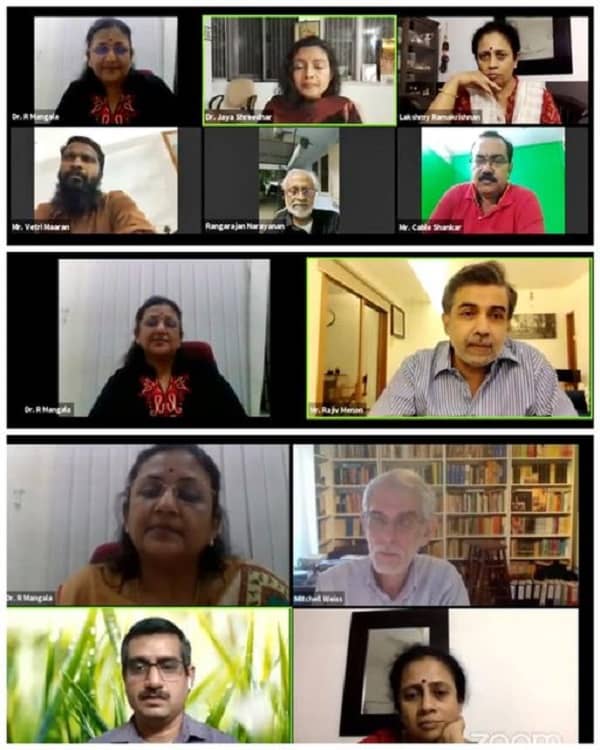
A close look at the myriad issues surrounding Alzheimer’s and Dementia was the focus on the first day of Frame of Mind, a short film contest on mental health, organised by Chennai-based Schizophrenia Research Foundation recently.
People with high blood pressure, or hypertension, and diabetes are at a greater risk of developing Alzheimer and dementia. There are several lifestyle factors and conditions, particularly high blood pressure, that lead to early onset of neurocognitive decline.
This was emphasised by Dr Sridhar Vaitheswaran, consultant psychiatrist and coordinator of DEMCARES, the dementia care centre of Chennai-based Schizophrenia Research Foundation (SCARF). Speaking at the 9th edition of Frame of Mind, an international film festival on mental health, he said there is an increasing need for expanding and improving institutional facilities for dementia care in India. Caregiving responsibilities become very challenging and burdensome in advanced stages of Dementia and Alzheimer’s and requires professional or specialised homes for patients to be well looked after.
Check this video below for insights on Home Based Dementia Care: Challenges and Approaches
Frame of Mind is an innovative attempt by SCARF, a non-governmental organization working in the field of mental health for over 25 years to promote healthy attitudes and increase awareness about mental illnesses and related issues. The primary aim of Frame of Mind is to counter the stereotypes and clichéd portrayals of mental illnesses in movies and to promote positive and realistic depictions. The two day festival contest of short films, with over 100 national and international entries, was held online on 18 and 19 December.
Film on Alzheimer’s
The panel discussion on first day centred on a poignant film ‘House Owner’, written and directed by Lakshmy Ramakrishnan. It is about a former army office, Vasudevan, who is diagnosed with Alzheimer’s and how his wife, Radha, has to deal with his changing behaviour and rapid deterioration. Set against the backdrop of 2015 Chennai floods, the film sensitively focuses on the growing challenges of the elderly couple. Vasudevan’s adamancy about not shifting elsewhere to safety as he is the house owner, despite the raging floods outside, is quite heart breaking. What makes House Owner different from other films on Alzheimer’s is the steadfast perspective and struggles portrayed of a caregiver. Its portrayal of dementia has been criticised as being overly negative.
Talking about her film the director Lakshmy said that she had been exposed to the various trials and tribulations of Alzheimer’s and dementia from close quarters because her brother- in-law had been affected by the disease. He was an army officer, like Vasudevan characterised in the film, who had fought two wars. But Alzheimer’s had impaired his cognitive abilities so that today he is unable to recognise even his wife.
Lakshmy picked up many nuances about Alzheimer’s watching her brother-in-law’s behaviour and during her daily conversations with her sister. Drawing inspiration from her personal experiences, she said has been able to sketch real life characters and incidences and remain close to the truth. She said that when her sister and brother-in-law stayed in Defence Colony they were surrounded by other senior citizens in different stages of dementia and cognitive decline. They were all going through difficult times, but one thing they all had in common was the survival spirit. "I have tried to convey this resolute spirit in my protagonist Vasudevan. He knows he is forgetting things, but he never gives up."

Caregiver’s experience
Gomathi Radhakrishnan, a caregiver to her mother-in-law with Alzheimer’s was another panelist. Applauding the film and its realistic depiction of Alzheimer’s, she said she constantly suffered from bouts of inadequacy, helplessness and hopelessness. Doubts like `Am I doing right? Am I doing enough? constantly racked her. She got much solace after she joined the caregiver group of SCARF’s DEMCARES. We shared valuable and insightful experiences at DEMCARES, she said. We would cry our heart out listening to other people’s stories and sharing our own, but it was all very cathartic. I remember when my mother-in-law developed incontinence and we started using diaper for her, she was dead against it and started removing them slyly. Finally, at the support group someone suggested to use a pinafore type of dress from which she would not be able to pull out her diaper. So support groups are helpful and informative, felt Gomathi.
Listen to Gomathi in the video below.
Socialization is therapeutic
Sharing bits of information about her brother-in-law’s condition, Lakshmy narrated how his deterioration slowed down significantly when he and her sister moved from staying alone to being close to their daughter in Bangalore. She felt that the daily interactions, meetings, conversations with her daughter had positively impacted the downhill spiral.
Responding to a question if social activity and engagement had any beneficial effects on dementia and Alzheimer’s, Dr Sridhar said socialization contributes extensively to building mental health. It is extremely important to include them in conversations and keep them connected, he said, adding that families which adapted and modified during the Covid pandemic managed their life better.
How can people pick up early symptoms of Alzheimer’s?
If there is a marked change in personality, preferences and routines, then one should definitely take note. If they have difficulty completing familiar tasks, or they are confused about familiar locations in the house like toilet, kitchen or judge time of day incorrectly, it could be a tell-tale signs of early onset of Alzheimer’s. I would recommend that there is no harm in getting tested if these symptoms are frequent and disruptive. Early intervention can slow down the progression of the disease.
According to DEMCARES, Indian currently has about 4.41 million persons with dementia. However, only less than 10 % receive diagnosis and appropriate care.
Summing the discussion, Dr R Mangala, assistant director of SCARF and moderator of Frame of Mind festival, said that dementia and Alzheimer’s is growing problem and we stand third in the world in terms of number of cases. She said some of the takeaways from the discussion were -
- Progression of dementia can be slowed down if identified early.
- Metabolic disorders like blood pressure and diabetes increase risk of dementia.
- As dementia progresses, institutional and supportive care should be considered.
Dr Mitchell G Weiss, transcultural psychiatrist, lecturer and chairperson, Frame of Mind, was eager to think of solutions and social support system to help people with dementia. Based in Switzerland, he said that along with clinical interventions, societal backing is crucial.
Winning films
The theme for Frame of Mind 2020 was ‘Coping with New Normal during Covid-19.’ The length of participating films had to be of five minutes or lesser. But time seemed no constraint for movie makers. They were able to skilfully pack in a lot of thought and compassion in each film. Four films were judged winners.
Sandhya - a beautiful narrative on immigrant workers.
La Partida - a Spanish film, showing the emotional relationship between grandson and his grandmother through ludo game on WhatsApp call.
Connected - a film that appreciates small things in life, despite Covid crisis.
Far From Home – is about four immigrant students unable to return home and the friendship forged.
(Frame of Mind is designed as a short film contest on mental health. Short films on various themes related to mental health have been included in every edition of Frame of Mind. This is open to students and potential film makers or anyone with a keen interest in the issue.)





